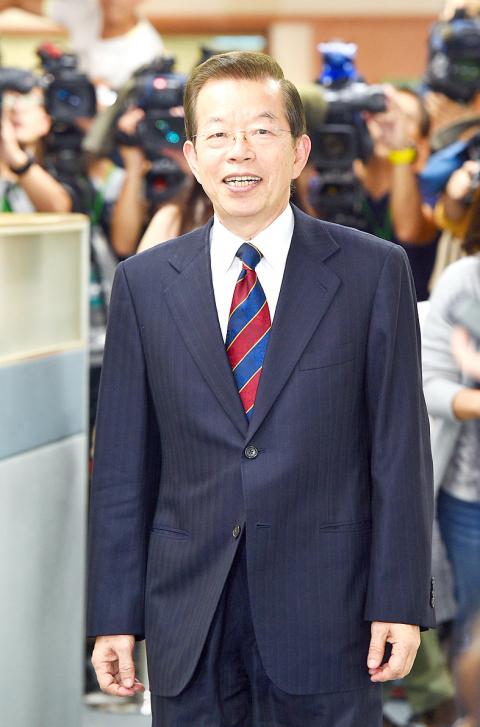Former premier Frank Hsieh (謝長廷) yesterday confirmed he would be appointed representative to Japan, adding that his mission would be to enhance cooperation between the two countries, but that he would not form any anti-China alliance with Japan.
Although it has long been an “open secret” among political circles and the media, Hsieh officially confirmed the appointment in an exclusive interview with the Nikkei Shimbun published yesterday.
In the interview with the Japanese newspaper, Hsieh said the appointment was significant for two reasons: First, it shows that president-elect Tsai Ing-wen (蔡英文) attaches great importance to the relationship between the two countries; and second, appointing a nonprofessional diplomat means that Tsai does not expect many problems between Taiwan and Japan.

Photo: Lo Pei-der, Taipei Times
He said in the interview that the incoming government hopes to make Taiwan a buffer zone between Japan and China, adding that the new government “would neither form an alliance with China against Japan nor form an alliance with Japan against China.”
Separately yesterday, Hsieh, in response to media queries, said that although there are disputes between Taiwan and Japan, the two nations should solve the problems without jeopardizing friendly relations.
“As to the dispute over sovereignty over the Diaoyutai Islands (釣魚台), I would say that the Diaoyutais belong to Taiwan, but the point is to solve the fishing issue for our fishermen, because they are disadvantaged and should not be sacrificed for political interests,” Hsieh said.
“That is why we eventually signed a fishing agreement with Japan,” he said.
Asked to comment on Japan’s recent seizure of Taiwanese fishermen near the Okinotori atoll in the Pacific Ocean, Hsieh said that both the executive and the legislative branches have handled it well.
“Premier Simon Chang (張善政) spoke about it, as did Legislative Speaker Su Jia-chyuan (蘇嘉全), while Japan soon released the fishermen,” Hsieh said.
“Now we should look at the fishing agreement we signed to see what we could improve to better take care of fishermen,” he said.

CHANGING LANDSCAPE: Many of the part-time programs for educators were no longer needed, as many teachers obtain a graduate degree before joining the workforce, experts said Taiwanese universities this year canceled 86 programs, Ministry of Education data showed, with educators attributing the closures to the nation’s low birthrate as well as shifting trends. Fifty-three of the shuttered programs were part-time postgraduate degree programs, about 62 percent of the total, the most in the past five years, the data showed. National Taiwan Normal University (NTNU) discontinued the most part-time master’s programs, at 16: chemistry, life science, earth science, physics, fine arts, music, special education, health promotion and health education, educational psychology and counseling, education, design, Chinese as a second language, library and information sciences, mechatronics engineering, history, physical education

DEADLOCK: As the commission is unable to forum a quorum to review license renewal applications, the channel operators are not at fault and can air past their license date The National Communications Commission (NCC) yesterday said that the Public Television Service (PTS) and 36 other television and radio broadcasters could continue airing, despite the commission’s inability to meet a quorum to review their license renewal applications. The licenses of PTS and the other channels are set to expire between this month and June. The National Communications Commission Organization Act (國家通訊傳播委員會組織法) stipulates that the commission must meet the mandated quorum of four to hold a valid meeting. The seven-member commission currently has only three commissioners. “We have informed the channel operators of the progress we have made in reviewing their license renewal applications, and

The High Prosecutors’ Office yesterday withdrew an appeal against the acquittal of a former bank manager 22 years after his death, marking Taiwan’s first instance of prosecutors rendering posthumous justice to a wrongfully convicted defendant. Chu Ching-en (諸慶恩) — formerly a manager at the Taipei branch of BNP Paribas — was in 1999 accused by Weng Mao-chung (翁茂鍾), then-president of Chia Her Industrial Co, of forging a request for a fixed deposit of US$10 million by I-Hwa Industrial Co, a subsidiary of Chia Her, which was used as collateral. Chu was ruled not guilty in the first trial, but was found guilty

Taiwan People’s Party (TPP) Chairman Huang Kuo-chang (黃國昌) yesterday appealed to the authorities to release former Taipei mayor Ko Wen-je (柯文哲) from pretrial detention amid conflicting reports about his health. The TPP at a news conference on Thursday said that Ko should be released to a hospital for treatment, adding that he has blood in his urine and had spells of pain and nausea followed by vomiting over the past three months. Hsieh Yen-yau (謝炎堯), a retired professor of internal medicine and Ko’s former teacher, said that Ko’s symptoms aligned with gallstones, kidney inflammation and potentially dangerous heart conditions. Ko, charged with